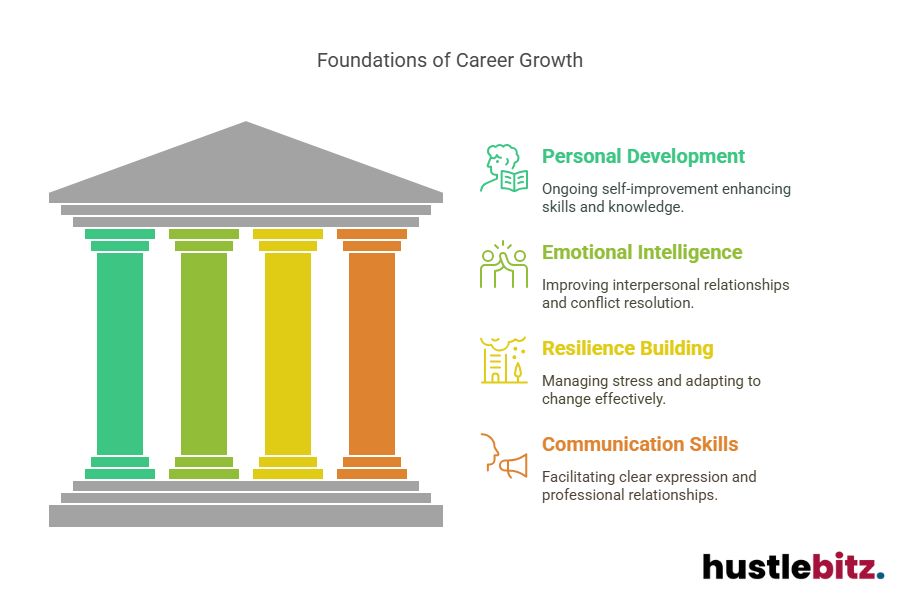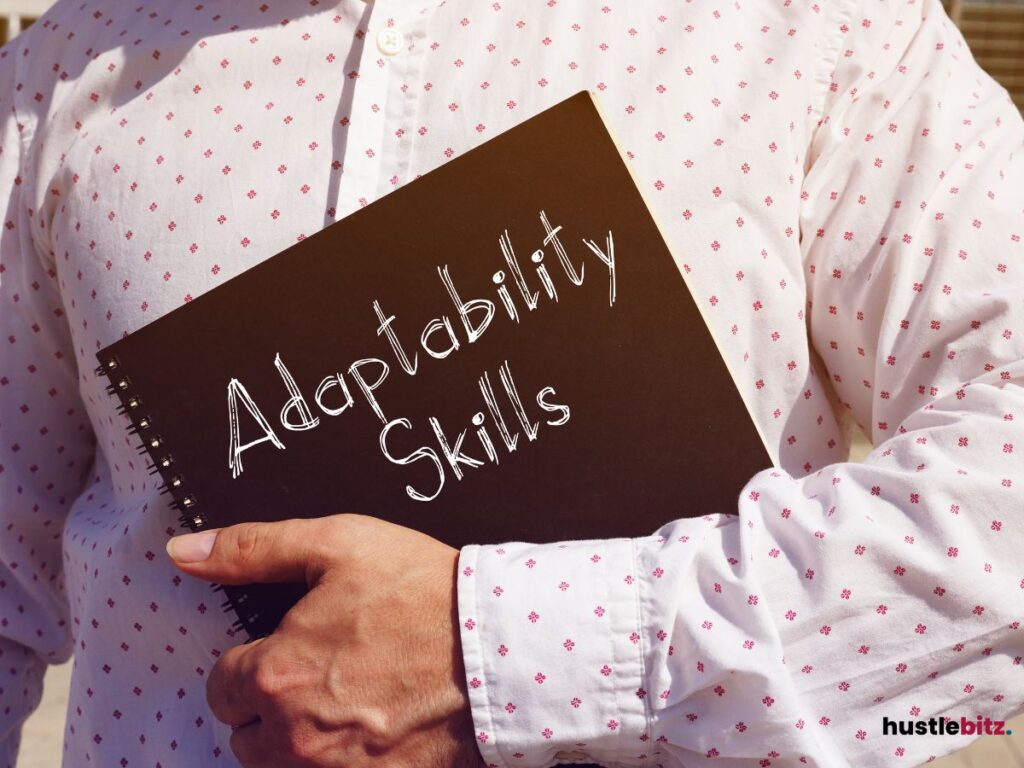Personal development significantly enhances your career journey by equipping you with essential skills and emotional intelligence. It encourages self-awareness, enabling you to set effective goals based on your strengths and weaknesses. Additionally, honing time management and communication skills promotes better collaboration and stress management. Building resilience prepares you to navigate challenges and adapt to change, while continuous learning keeps you relevant in a dynamic job market. Furthermore, networking and relationship-building open doors for opportunities and professional growth. Understanding these facets can lead to transformative career advancements. Discovering the practical applications of these strategies could further empower your professional path.
Key Takeaways
- Personal development fosters ongoing self-improvement, enhancing skills and knowledge essential for career advancement.
- Emotional intelligence improves interpersonal relationships and conflict resolution, crucial for effective collaboration in the workplace.
- Building resilience through personal development equips individuals to manage stress and adapt to change, promoting a proactive career approach.
- Enhancing communication skills, such as active listening and assertiveness, facilitates clearer expression of ideas and fosters professional relationships.
- Continuous learning and adaptability enable professionals to keep pace with industry trends, ensuring they remain competitive and relevant in their careers.

Understanding Personal Development
Personal development is the ongoing process of self-improvement that enhances an individual’s skills, knowledge, and personal qualities, ultimately leading to greater career success and fulfillment.
At the core of this journey are self-awareness practices that allow individuals to understand their strengths and weaknesses, paving the way for effective goal setting. By establishing clear objectives, individuals can channel their efforts into meaningful pursuits.
Effective time management is crucial for reaching these goals, allowing for the prioritization of tasks and the allocation of resources. Incorporating mindfulness techniques fosters a focused approach, enhancing concentration and reducing distractions.
In tandem, motivation strategies, such as setting small milestones, can sustain enthusiasm and commitment throughout the development process.
Personal branding becomes essential as individuals learn to showcase their unique skills and experiences in a competitive job market. This self-presentation is complemented by stress management techniques that help maintain mental well-being amid challenges.
Furthermore, creative thinking nurtures innovative solutions, enabling individuals to adapt and thrive in dynamic environments.
Engaging in self-reflection exercises is vital for assessing progress and adjusting strategies as necessary. This ongoing evaluation supports habit formation, solidifying positive behaviors that contribute to personal and professional growth.
The Role of Emotional Intelligence

Emotional intelligence plays a pivotal role in personal and professional development by enabling individuals to effectively recognize, understand, and manage their own emotions as well as those of others. This skill set is crucial for fostering emotional awareness, which helps individuals navigate their feelings and those of their colleagues. By honing empathy skills, professionals can build stronger interpersonal relationships, allowing for better collaboration and conflict resolution.
The application of emotional intelligence in the workplace can significantly enhance leadership influence. Leaders who practice self-regulation techniques can remain composed under pressure, demonstrating emotional resilience that inspires confidence in their teams. Additionally, social awareness allows individuals to recognize the emotional climate of their environment, facilitating effective stress management and motivation enhancement strategies.
The table below encapsulates the key components of emotional intelligence and their benefits:
| Component | Benefit |
| Emotional Awareness | Better understanding of feelings |
| Empathy Skills | Enhanced interpersonal relationships |
| Self Regulation Techniques | Improved stress management |
| Social Awareness | Effective conflict resolution |
Building Resilience in the Workplace

Cultivating resilience in the workplace is essential for employees to effectively navigate challenges and maintain productivity in the face of adversity. Resilience empowers individuals to cope with stress, embrace change, and thrive under pressure. By focusing on certain strategies, employees can enhance their resilience, leading to a more positive work environment.
Effective stress management is foundational to resilience. Employees can benefit from implementing workplace mindfulness practices that promote a balanced mindset. Additionally, fostering positive thinking helps in developing a proactive approach to challenges.
Here are some key strategies to build resilience:
- Adaptability strategies: Embrace change by being open to new ideas and flexible in your approach.
- Self-care practices: Prioritize physical and mental well-being through regular exercise, healthy eating, and adequate rest.
- Conflict resolution: Develop skills to address and resolve disagreements constructively, ensuring a harmonious workplace.
- Goal setting: Create clear, achievable goals to maintain motivation and provide direction amidst challenges.
Incorporating these techniques fosters a greater sense of control and encourages feedback acceptance. Establishing professional boundaries is essential as well, allowing employees to recharge and focus on their responsibilities.
Enhancing Communication Skills
Effective communication skills are vital for fostering collaboration and understanding within the workplace, building on the resilience that employees develop to navigate challenges successfully.
Mastering these skills involves more than just conveying information; it encompasses active listening, which ensures that messages are accurately received and understood.
Nonverbal cues play a significant role in communication, as body language and facial expressions often convey more than words alone.
Developing assertive communication is essential for expressing thoughts and ideas clearly while also respecting others’ perspectives.
Public speaking and presentation skills are equally crucial, enabling individuals to articulate their ideas confidently in various professional settings.
Incorporating effective feedback mechanisms can enhance communication by promoting open dialogue and continuous improvement.
This is particularly relevant in conflict resolution, where clear communication can help de-escalate tensions and foster understanding among team members.
Empathy training is another important aspect, allowing individuals to appreciate diverse viewpoints and engage in cross-cultural communication effectively.
Networking and Relationship Building

Networking and relationship building are essential components for advancing one’s career, as they create opportunities for collaboration, mentorship, and support within professional environments. Effective networking strategies enable individuals to establish and nurture professional connections that can lead to numerous career advancements.
To optimize your networking efforts, consider the following key practices:
- Attend industry events: Engage actively in conferences, workshops, and seminars relevant to your field. These gatherings provide a platform to meet like-minded professionals and potential mentors.
- Utilize social media: Leverage platforms such as LinkedIn to expand your network. Sharing insights and participating in discussions can enhance your visibility and establish your credibility.
- Focus on relationship management: Build trust with your connections by staying engaged. Regular check-ins and thoughtful conversations can solidify relationships over time.
- Implement effective follow-ups: After meeting someone, send a personalized message to express your appreciation for the interaction. This reinforces your interest in maintaining the connection.
Continuous Learning and Adaptability

Building strong professional relationships not only opens doors to new opportunities but also highlights the importance of continuous learning and adaptability in today’s rapidly evolving job market. As industries change and technology advances, individuals must engage in skill acquisition through various avenues. Online courses and mentorship programs are effective tools for keeping pace with industry trends and enhancing professional certifications.
To facilitate continuous learning, professionals should embrace time management and goal setting. Establishing clear objectives enables individuals to focus on relevant skills while efficiently utilizing their time. Additionally, utilizing self-assessment tools can help identify areas for improvement and track progress.
Feedback mechanisms are vital in this process; they provide insight into performance and reinforce the importance of adaptability during career transitions. By remaining open to constructive criticism, professionals can refine their skills and better align themselves with organizational goals.
The table below summarizes key strategies for fostering continuous learning and adaptability:
| Strategy | Description | Benefits |
| Skill Acquisition | Gaining new skills through varied learning paths | Enhances employability |
| Online Courses | Flexible learning options available online | Access to diverse knowledge |
| Mentorship Programs | Guidance from experienced professionals | Personal and professional growth |
Overcoming Career Obstacles

Identifying and confronting career obstacles is essential for professional growth and can significantly impact long-term success.
Career setbacks, such as skill gaps or changes in industry dynamics, often require individuals to engage in self-assessment tools to pinpoint areas for improvement. By clearly understanding one’s strengths and weaknesses, professionals can develop tailored strategies for overcoming challenges and enhance their capabilities.
To navigate these hurdles effectively, consider implementing the following strategies:
- Goal Setting: Establish clear, measurable objectives that align with both personal aspirations and professional requirements.
- Time Management: Prioritize tasks to ensure that critical skill development and career advancement activities receive adequate attention.
- Mentorship Opportunities: Seek guidance from mentors who can offer insights and share strategies for overcoming obstacles.
- Work-Life Balance: Maintain a healthy equilibrium to reduce stress, thereby fostering a positive mindset conducive to overcoming fear and adapting to change.
Final Thoughts
Personal development is a continuous journey that plays a crucial role in enhancing your career. By focusing on self-awareness, emotional intelligence, resilience, communication, and continuous learning, you can build a strong foundation for long-term success. As you develop these skills, you’ll be better equipped to navigate challenges, adapt to changes, and create meaningful professional relationships. Embracing personal growth fosters a proactive mindset that keeps you motivated and prepared to seize opportunities. By investing in these strategies, you can accelerate your career journey and achieve lasting fulfillment in both your personal and professional life.




